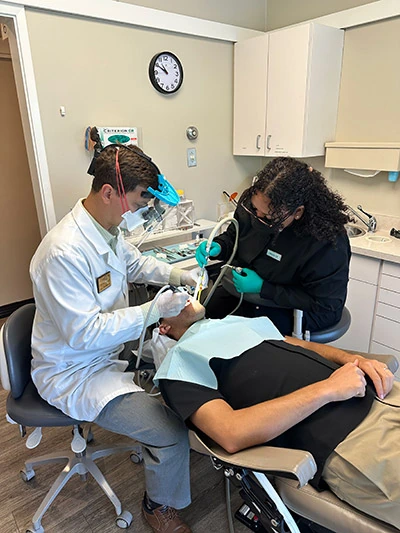Does California Medi Cal Cover Dental Implants?

California Medi-Cal covers dental implants only when medically necessary and with prior authorization. Dental coverage is subject to limitations and criteria under the Medi-Cal Dental Program.
Understanding dental benefits under California Medi-Cal is crucial for recipients in need of dental implants. Medi-Cal, the state’s Medicaid program, provides healthcare benefits, including some dental services, to eligible individuals and families. Coverage details can be complex, but knowing whether major procedures like dental implants are included helps beneficiaries manage their oral health proactively.
While Medi-Cal does extend to a range of dental services, it’s important to note that criteria for coverage approval of dental implants are stringent. Individuals considering dental implants should consult with their dental provider and review the Medi-Cal Dental Program guidelines to determine if their situation meets the criteria for this advanced treatment.

Introduction To California Medi-cal And Dental Coverage
Access to comprehensive healthcare is a vital aspect of leading a healthy lifestyle. California’s Medi-Cal program plays a pivotal role in providing eligible residents with the medical attention they require, including dental services. Understanding what Medi-Cal covers, especially when it comes to dental care, empowers beneficiaries to better navigate their options and make informed decisions about their oral health. This segment dives into the nuances of Medi-Cal dental coverage, specifically discussing the availability of dental implants under the program.
Medi-Cal stands as California’s Medicaid program. It offers health coverage to low-income individuals and families, ensuring access to vital healthcare services. Benefits extend to a multitude of services aimed at maintaining overall health, with enrollment open to eligible residents, including children, pregnant women, the elderly, disabled individuals, and those requiring long-term care.
Dental benefits under Medi-Cal, known as Denti-Cal, cover a range of preventative and restorative services. From check-ups to fillings, and more, the program addresses many dental care needs. Yet, the extent of coverage often leads to questions about what specific treatments are included, particularly when it comes to more advanced procedures like dental implants.
When it comes to Medi-Cal and dental implants, myths abound. A common misconception is that Medi-Cal does not cover any type of dental implants. It’s crucial to separate fact from fiction and understand the actual boundaries of the plan. While traditionally limited, Denti-Cal coverage has evolved, rendering it essential for beneficiaries to stay informed about the current state of their dental benefits.

Credit: www.usatoday.com
Medi-cal Dental Services: Scope And Limitations
Understanding the scope and limitations of Medi-Cal Dental Services is crucial for recipients who require dental care, including more advanced procedures like dental implants. While Medi-Cal provides a range of dental benefits, it’s important to know precisely what’s covered, to what extent, and the conditions of eligibility. Let’s delve into the specifics of Medi-Cal’s dental coverage to better guide you through the process of accessing the dental care you need.
Comprehensive Analysis Of Covered Dental Procedures
Medi-Cal’s dental program, known as Denti-Cal, includes a variety of treatments to ensure beneficiaries maintain good oral health. The covered services span from routine cleanings to more intricate procedures:
- Preventative services: Regular exams, X-rays, and cleanings.
- Restorative services: Fillings and crowns to repair damaged teeth.
- Oral surgery: Extractions and other surgical interventions.
- Periodontal services: Treatment for gum disease and related conditions.
- Orthodontics: Braces and other corrective treatments, subject to limitations.
Specifics Of Dental Implant Coverage Under Medi-cal
Dental implants are a popular solution for missing teeth; however, Medi-Cal coverage for dental implants is limited. Typically, coverage is only provided in medically necessary situations and requires prior authorization based on a set of specific clinical criteria and conditions.
Restrictions And Eligibility Criteria For Dental Implants
To qualify for dental implant coverage through Medi-Cal, patients must meet certain eligibility criteria. These include:
- Proof of medical necessity for the implants.
- A thorough examination by a Medi-Cal authorized dental professional.
- Prior authorization and documentation demonstrating the failure of alternative treatments.
Dental implants are often not the first line of treatment, and eligibility restrictions ensure they’re used when other options are not viable.
Alternative Treatments Covered By Medi-cal
When dental implants are not covered, Medi-Cal beneficiaries still have access to a range of alternative treatments:
- Dentures: Full or partial replacements for missing teeth.
- Bridge work: Fixed or removable appliances to bridge the gap of missing teeth.
- Other prosthetic services: Services that help restore oral function.
These alternative treatments are generally more likely to be covered by Medi-Cal, though specific eligibility criteria still apply.
Navigating The Medi-cal System For Dental Implants
Understanding the intricacies of insurance coverage can often lead to frustration, especially when determining if particular procedures like dental implants are included. For individuals on Medi-Cal, California’s Medicaid program, knowing the roadmap to potential dental implant coverage is key. Below, uncover the steps and requirements that can shed light on whether your journey with Medi-Cal may lead to a happier, healthier smile.
Steps To Accessing Dental Implant Coverage
Embarking on the path to obtaining dental implants through Medi-Cal involves several clear steps. Here is an outline to guide you:
- Verify Eligibility: Confirm that your Medi-Cal plan includes dental benefits under the Denti-Cal program.
- Understand Coverage: Review the specifics of what types of dental services, including dental implants, are covered.
- Consultation: Schedule a consultation with a Denti-Cal approved dentist to evaluate your implant needs.
- Pre-treatment Authorization Request (PTAR): Your dentist will submit a PTAR to Denti-Cal for approval.
- Follow-up: Stay informed about the progress of your PTAR and be prepared for further documentation if required.
Required Documentation And Approval Process
The pursuit of dental implant coverage through Medi-Cal may demand specific documentation:
- Dental Records: Current x-rays and dental records to support the need for implants.
- Medical Necessity: Justification from your dentist or specialist as to why dental implants are medically necessary.
- PTAR: The completed Pre-treatment Authorization Request form.
Approval Process: After submission, Denti-Cal reviews the PTAR along with the accompanying documents. The review process may take several weeks, and additional information might be requested. Approval is contingent upon meeting Denti-Cal’s criteria for medical necessity and cost-effectiveness.
Finding Medi-cal Approved Dental Providers
Only certain dental providers are authorized to perform services under the Medi-Cal program. Follow these tips to locate a Denti-Cal approved provider:
- Use the Denti-Cal provider referral list available on the official website or contact Denti-Cal’s customer service for assistance.
- Confirm with the dental office that they are current Denti-Cal providers and accept new patients under this program.
- Ask about the dentist’s experience with dental implants and working with Medi-Cal for such procedures.
Appealing Medi-cal Decisions On Dental Implant Coverage
If Medi-Cal denies your dental implant coverage, you have the right to appeal:
- Understand the Denial: Review the reasons for denial carefully. Denials are often due to lack of information or a misunderstanding of your needs.
- Request for Reconsideration: Submit a written request for reconsideration, including any additional supporting documentation.
- State Hearing: If reconsideration doesn’t yield a positive outcome, you may request a state hearing to present your case.
- Legal Aid: Consider seeking assistance from legal aid organizations experienced in Medi-Cal cases.
Understanding your rights within the Medi-Cal system is crucial, and persistence can often be a determining factor in securing the coverage you need for dental health and quality of life.

Credit: www.wcdentists.com
Frequently Asked Questions For Does California Medi Cal Cover Dental Implants?
Does Medicare Pay For Dental Implants In California?
Medicare generally does not cover dental implants in California. Exceptions may exist for medically necessary procedures, but routine implant coverage is not provided.
Does California Medi-cal Pay For Dentures?
Yes, California Medi-Cal covers dentures. Eligible beneficiaries can receive these dental prosthetic devices as part of their benefits.
How Much Is A Full Set Of Dental Implants In California?
The cost for a full set of dental implants in California typically ranges from $25,000 to $50,000. Prices can vary based on individual patient needs and clinic specifics.
What Does Medi-cal Cover For Adults In California?
Medi-Cal provides California adults with essential health benefits, including hospital services, prescription drugs, mental health care, and preventive services. It also covers dental care, vision, and emergency services.
Conclusion
Understanding the intricacies of Medi-Cal’s dental coverage can be complex. Fortunately, while dental implants are not typically covered, alternatives exist. Check your policy or consult with a specialist for tailored advice. Always stay informed about your healthcare options and eligibility to ensure optimal dental health.





